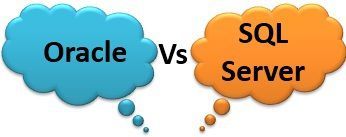 Among many Relational Database Management System (RDBMS), the two most popular and widely used are Oracle and SQL Server. There are many fundamental differences between Oracle and SQL Server one of the most important differences between them is the language they use. Oracle uses PL/SQL (Procedure Language SQL), and SQL Server uses T-SQL i.e. Transact-SQL.
Among many Relational Database Management System (RDBMS), the two most popular and widely used are Oracle and SQL Server. There are many fundamental differences between Oracle and SQL Server one of the most important differences between them is the language they use. Oracle uses PL/SQL (Procedure Language SQL), and SQL Server uses T-SQL i.e. Transact-SQL.
Let us discuss some more differences between Oracle and SQL Server with the help of the comparison chart shown below.
Content: Oracle Vs SQL Server
Comparison Chart
| Basis for Comparison | Oracle | SQL SERVER |
|---|---|---|
| Basic | Language used by Oracle is PL/SQL (Procedural Language/ SQL). | Language used by SQL Server is T-SQL (Transact-SQL). |
| Transaction | In Oracle, no transaction is committed until DBA explicitly issues COMMIT command. | If BEGIN TRANSACTION and COMMIT commands are not specified, it executes and commit each command individually. |
| Organization | Database is shared among all schemas and users. | Database not share among the users. |
| Packages | Procedures, function and variable are grouped together into Packages. | Packages are not there in SQL. |
| OS Support | Windows, Linux, Solaris, HP-UX, OS X, z/OS, AIX. | Windows and Linux. |
| Complexity | Complex but powerful. | Simpler and easy to use. |
Definition of Oracle
Oracle is a Relational Database system that supports all the core features of SQL. In addition, Oracle also supports many other languages. Many Operating System supports Oracle like Windows, Linux, Solaris, HP-UX, OS X, z/OS, AIX. The original language used by Oracle is PL/SQL i.e. Procedure Language SQL which is the procedural extension of SQL. Oracle provide Packages that can encapsulate the procedures, functions and the variable of the database to form a single unit.
In Oracle, on execution of the queries or commands, the changes are made only to the memory. No change is committed until the DBA (Database Administrator) issues an explicit COMMIT command. As soon as, COMMIT command is executed the changes are made to disk and command after COMMIT begins a new transaction.
The database schema of Oracle the groups all the database objects. These database objects are shared among the schemas and users of Oracle database. Though the database objects are shared among all the users, the user can be restricted from accessing the database via roles or permission. Oracle is complex but is a powerful RDBMS.
Definition of SQL Server
Like Oracle, SQL Server is also a Relational Database System. The language used by SQL Server is T-SQL i.e. Transact-SQL. SQL Server is supported only by Windows Operating System. Like Oracle, SQL Server does not have Packages to encapsulate all the procedures, functions and variables of the database.
In SQL Server, if BEGIN TRANSACTION and COMMIT commands are not specified, each command is executed and committed individually. In case, if any error is encountered in the middle of execution of all the command then the rollback becomes difficult as committed command won’t rollback. If carefully used ROLLBACK command can reduce data corruption.
SQL Server does not share the database with the user. The database is stored on the unshared disk in a server. If any user needs to access the database, then the user is assigned a login-id.
Key Differences Between Oracle and SQL Server
- The language used by Oracle is PL/SQL i.e. Procedure language SQL whereas, SQL Server uses T-SQL i.e. Transact-SQL.
- Unless DBA issues COMMIT command, no transaction is committed. On the other hand in SQL, if BEGIN TRANSACTION and COMMIT is not specified, each command is executed and committed individually.
- In Oracle, the database is shared among all the schemas and users, though users can be limited to access certain schema or table via roles and permission. On the other hands, in SQL server the database is kept private on the server, the users are provided with a login to grant access to the database.
- In Oracle, the procedures, functions and variables are encapsulated into Packages. However, SQL does not have Packages.
- Oracle is supported by many operating systems like Windows, Linux, Solaris, HP-UX, OS X, z/OS, AIX. On the other hand, SQL is supported by Windows and Linux.
- Oracle is more complex but powerful whereas, SQL is simpler and easy to use.
- The syntax of the commands used by Oracle and SQL also differs.
Conclusion
Oracle and SQL Server, being different in many aspects neither is preferable over the other. It depends on the situations which one to use. Both are equivalently powerful.
darren says
Thank you
Nipun Sareen says
True, nice job.
janani says
good, nice
Kuassi says
Beautifully compared!